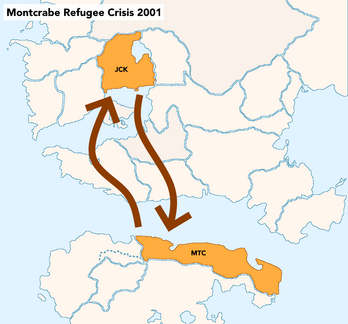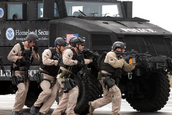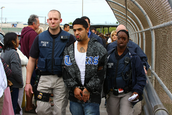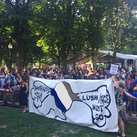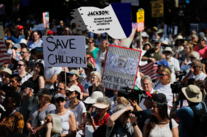2001 Montcrabin refugee crisis
Map of Crisis, Operation Poseidon, Arrest of an alleged anti-Montcrabin activist, Protesters at Victoria Park ("Immigrants stay, Lush must go"), Protesters during New Year's Eve 2001 ("Jackson: Bending over to Montcrabin interests, circa 2001") | |
| Date | 2001–2003 |
|---|---|
| Location | |
| Part of a series on |
| Corruption in Jackson |
|---|
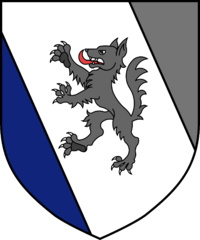 |
|
|
During 2001, there was a period of significant movement of Montcrabin refugees into Jackson. 200 thousand people came to the country in hopes of asylum, the most in a single year since the Creeperian Civil War. They were mostly ethnic Homards, but also included Monsettlels and even some Crabin groups. The increase in asylum seekers has been attributed to the anti-communist crack-down in Montcrabe, which went into full effect in 1974, but was relaunched in late 1999 after various communist and democratic protests and riots in Perelocusta.
Between 1974 and 1999, thousands of Montcrabin refugees were publicly welcomed into Jackson by sitting presidents x y and z, as part of their campaign promises and growing pro-immigration movements. More than 430,000 refugees and legal migrants had their citizenship applications accepted by the government during this period. [lower-alpha 1] Starting with the presidency of Beau Lush, only 1,693 new Montcrabin migrants had their citizenship applications accepted. Between 2001 and 2003, more than 172,000 Montcrabins were deported back to Montcrabe under Lush's leadership, with some having no previous affiliation with Montcrabe except for protesting against its government through various means - including those born in Jackson from parents of Montcrabin descent. [1]
According to various reports and investigations, Beau Lush secured victory in the 2000 Jackson Presidential Election with monetary and political assistance from the government of Montcrabe. These claims allege that the government of Montcrabe, through its Principal Investment Fund and the Crabwater Group, interfered in the electoral process to favor Lush's candidacy. Most details of the supposed meddling remain a subject of ongoing investigation, with claims ranging from financial support to the dissemination of disinformation aimed at discrediting Lush's opponents, and even blackmail. According to declassified reports from the Jackson Intelligence Bureau, Lush waged war on and deported members of Montcrabe's Communist Movement, in return for the Montcrabin government's support and funding. Hundreds of thousands of refugees were captured in Jackson and returned to Montcrabe where, some allege, they were "beaten, imprisoned, and murdered" [2] by Montcrabin officials.
The crisis, and its subsequent investigations and controversy, had significant impacts in Jackson and Montcrabe. Many Ecrosians expressed worries toward the treatment of the situation, and the alleged corruption prompted by Montcrabin influence. Political polarization, on both sides, became widespread in Jackson - with the likes of President Gabriel Reyna using the situation to discredit Beau Lush and the People's Party, especially heading into the 2010 Jackson Presidential Election and the end of Lush's term in office.
Contents
Terminology
News outlets and academic sources refer to the 2001 events as both refugee crisis and migrant crisis, often interchangeably. Some argue, though, that the use of the term migrant crisis is inaccurate in the context of people fleeing political suppression and persecution because it implies that they are emigrating voluntarily rather than being forced to leave.
Causes of Montcrabin refugees
Means of entry into Jackson
Montcrabe to Jackson directly
Montcrabin immigrants could go directly from Montcrabe to Jackson via sea to avoid most border crossings and risk involving borders. But, this method often resulted in death due to dehydration, starvation, and becoming lost at sea due to insufficient navigational systems.
Montcrabe to Victoria
Montcrabin immigrants often traveled to Victoria due to the island's high density of people of Montcrabin descent. Border patrol was often less strict at the port of Victoria as compared to other ports. Unfortunately, this solution was not ideal because the cost of living everywhere on Victoria Island was much higher as compared to the rest of Jackson. Also, starting in 2001, Montcrabe government officials were stationed in the town of South Bend outside of Victoria to spy on and capture immigrants.
Montcrabe to Greenville
The second most popular route was to sail to the city of Greenville. Greenville itself had high costs of living but the government of Jackson offered intercity bus services to transport immigrants to less expensive towns and cities. Greenville had heightened port security, but this could usually be bypassed by applying for citizenship on arrival, which granted temporary immunity until applications were reviewed.
Montcrabe to Pavulturilor
In order to avoid navigation through open ocean, which often led to death, some immigrants chose to go across the Romanyan Sea and travel by land to Jackson through Pavulturilor. Few who chose this method survived due to having to cross through countries such as Terranihil, in which police would often execute Montcrabins on sight.[3]
Peak of the crisis
Jackson response
Public opinion
Notes
- ↑ 431,000 applications for citizenship were accepted between 1974 and 1999 from 512,000 total submissions, with an acceptance rate of 84%.
References
- ↑ "Jackson Statistics: Net Migration". Department of Statistics - Jackson. December 20, 2018.
- ↑ Macmiller, Beau Lush, ed. (2015). Beau Lush: My Corruption. Rochester. ISBN 978-3-643-90802-5. OCLC 406300783.
- ↑ "Exploring the Means of Travel from Montcrabe to Jackson". WSCI Journal. March 14, 2004.
